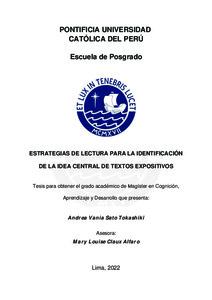| dc.contributor.advisor | Claux Alfaro, Mary Louise | |
| dc.contributor.author | Sato Tokashiki, Andrea Vania | |
| dc.date.accessioned | 2022-11-09T21:42:30Z | |
| dc.date.available | 2022-11-09T21:42:30Z | |
| dc.date.created | 2022 | |
| dc.date.issued | 2022-11-09 | |
| dc.identifier.uri | http://hdl.handle.net/20.500.12404/23757 | |
| dc.description.abstract | El presente estudio tiene como finalidad identificar las estrategias de lectura que utilizan
algunos estudiantes de una institución preuniversitaria de Lima para hallar la idea central en
textos expositivos y comprender cómo las usan. Para ello, mediante un método cualitativo y
un diseño metodológico epistemológico realista, se entrevistó a 12 estudiantes que cursaban
el ciclo regular 2021 de abril-julio de la institución y que postulaban a carreras de Ciencias.
Fueron divididos en dos grupos: alto rendimiento (n=8) y bajo rendimiento (n=4) en
comprensión de lectura según los resultados de un subtest de comprensión de lectura. Las
entrevistas se llevaron a cabo luego de que el estudiante leyera un texto asignado con el fin de
indagar sobre las estrategias de lectura que se activaron en dicho proceso. Se analizó el
contenido de la transcripción de las entrevistas por medio del software Atlas.ti. Los resultados
evidenciaron que los estudiantes de bajo rendimiento, a diferencia de los de alto rendimiento,
no usaron estrategias de lectura para reconstruir la idea central de un texto expositivo, ni
ajustaron sus estrategias de lectura al propósito de la tarea, ni al tipo de texto, ni a sus
características textuales, sino que activaron procesos poco eficaces para la tarea. Asimismo,
leían de manera literal, mostraron un menor nivel de dominio de la lectura, insuficientes
destrezas de la memoria de trabajo y en sus procesos metacognitivos, así como baja
motivación, autoeficacia y gusto por la lectura. | es_ES |
| dc.description.abstract | The present study aimed to identify reading strategies used by students from a pre-university
institute in Lima for the purpose of finding the main idea of an expository text, and to
comprehend how they use these strategies. A qualitative method and an epistemological
realistic design were used to interview 12 students from the April-July, 2021 regular
program, who were applying for science careers. The interviewed students were divided into
two groups according to the outcome attained in a reading comprehension subtest: high
achieving (n = 8) and poor achieving students (n = 4). Each interview was carried out just
after the student had read an assigned text, in order to inquire about the reading strategies that
were activated in their mental process while reading this text. Interviews’ transcripts were
content analyzed using the Atlas.ti software. Results showed that poor-achieving students,
unlike the high-achieving students, did not use reading comprehension strategies to find the
main idea of an expository text, nor did they adjust their reading to the purpose of the task,
nor to the type and characteristics of the text, but rather activated processes that were not
efficient for the task. Likewise, they reached just a literal reading level, that showed an
elementary reading development level, insufficient working memory skills and metacognitive
processes, as well as, low motivation, poor self-efficacy and little enjoyment of reading. | es_ES |
| dc.language.iso | spa | es_ES |
| dc.publisher | Pontificia Universidad Católica del Perú | es_ES |
| dc.rights | info:eu-repo/semantics/openAccess | es_ES |
| dc.rights.uri | http://creativecommons.org/licenses/by/2.5/pe/ | * |
| dc.subject | Comprensión de lectura | es_ES |
| dc.subject | Lectura--Estudio y enseñanza | es_ES |
| dc.subject | Estudiantes--Investigaciones--Perú--Lima | es_ES |
| dc.title | Estrategias de lectura para la identificación de la idea central de textos expositivos | es_ES |
| dc.type | info:eu-repo/semantics/masterThesis | es_ES |
| thesis.degree.name | Magíster en Cognición, Aprendizaje y Desarrollo | es_ES |
| thesis.degree.level | Maestría | es_ES |
| thesis.degree.grantor | Pontificia Universidad Católica del Perú. Escuela de Posgrado | es_ES |
| thesis.degree.discipline | Cognición, Aprendizaje y Desarrollo | es_ES |
| renati.advisor.dni | 07822536 | |
| renati.advisor.orcid | https://orcid.org/0000-0001-5684-418X | es_ES |
| renati.author.dni | 44315218 | |
| renati.discipline | 199237 | es_ES |
| renati.juror | Frisancho Hidalgo, Susana del Mar | es_ES |
| renati.juror | Claux Alfaro, Mary Louise | es_ES |
| renati.juror | Villegas Regalado, Frank Joselin | es_ES |
| renati.level | https://purl.org/pe-repo/renati/level#maestro | es_ES |
| renati.type | https://purl.org/pe-repo/renati/type#tesis | es_ES |
| dc.publisher.country | PE | es_ES |
| dc.subject.ocde | https://purl.org/pe-repo/ocde/ford#5.03.01 | es_ES |






